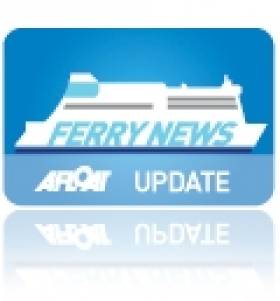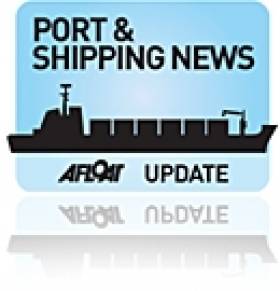Displaying items by tag: M4 motorway
Restructured Fastnet Line Reduce Year Round Service to Seasonal Schedule
The discontinued winter sailing schedule for this year is also expected not to be repeated during October 2012-March 2013. Fastnet Line's decision to make the Celtic Sea route into a shoulder season and summer only service follows a similar path taken by Stena Line which withdrew Dun Laoghaire-Holyhead (HSS) sailings in mid-September, for report click here. The central corridor route is due to reopen sometime in April or May 2012.
Cork City and County council and Kerry County council have provided €700,000 to support Fastnet Line and yesterday they announced an additional €150,000 in co-funding for the period of the examinership. In order to stabilise finances the ferry company are to radically reduce passenger capacity of the Julia (see photo) from 1,500 down to 950. This is in line with the capacities of the Julia serving 'night' sailings.
She has a crew predominately from Eastern Europe and Irish and UK deck officers. The Bermuda flagged, Hamilton registered vessel is currently berthed at Ringaskiddy Ferry Terminal, Cork Harbour. At 154m she is the largest ferry to date capable of berthing in the limited confines of the swing basin in Swansea and with a draft of 5.8m in a port which is subject to a large tidal range on the Bristol Channel.
Operating costs on the 10 hour service has been severely hampered by continuing increases to world oil prices. From the year 2010 to this year, fuel costs rose by 27% and almost 50% from the original budget of 2009. The company claims that each crossing amounts to €18,560 alone in fuel costs.
Fastnet Line to date has carried 150,000 customers, of which 75% have originated from the UK market, generating on average €350 per person (€40m approx) exclusive of fare and on-board spend. This crucial market is core to the success of the company's direct 'gateway' route to scenic south-west Ireland, with Swansea connected to the M4 motorway linking midland population centres and London. The operator claims a saving of 600km driving based on a round trip compared to using rival ferries running on routes to Rosslare from Pembroke Dock and Fishguard.
Since the reinstatement of the service in March 2010, after Swansea Cork Ferries pulled the Superferry (photo) off-service in 2006, the loss to tourism generated revenue on both sides of the Celtic Sea was estimated to be £25m per annum according to the Welsh Assembly and a similar figure recorded in the Cork and Kerry region.
The company also outlines the reduction in carbon emissions saved from operating the only direct service specifically connecting the regions of Glamorgan and Munster. Some 500,000 freight miles alone were saved in the Welsh region since the service started instead of using alternative route running from Pembrokeshire ports.
- Cork Harbour
- west cork
- port of Cork
- Celtic sea
- Cork City council
- Fastnet Line
- M.V. Julia
- M4 motorway
- Kerry
- Irish High Court
- Stena Line
- Ports and Shipping News
- cork harbour news
- Ferry news
- HSS
- Welsh Assembly
- Cork County Council
- Associated British Ports
- ABP
- Ringaskiddy Ferry Terminal
- M.V. Superferry
- SwanseaCork Ferries
- SCF
- Fastnet Line Group
- Kerry County Council
- HSS Dun LaoghaireHolyhead sailings
- Glamorgan
- Munster regions
- Bristol Channel
- Bristol Channel tidal range
- Swansea Port
- Irish tourism sector
- Pembroke DockRosslare
- FishguardRosslare
Fastnet Line Exceed Expectations
Fastnet Line recorded carrying over 60,000 passengers up to the end of August since the Cork-Swansea route re-opened in March, served by the 21,699 tonnes M.V. Julia, writes Jehan Ashmore.
Commenting on the inaugural season, Paul O'Brien, general manager of Fastnet Line said figures were ahead in June, July and August by an average of 10%. Over 13,000 passengers were carried during July and 15,000 in August on the 10-hour service.
Businesses in the south-west region have reported increased tourism activity and is it from here and in south Wales that many of the shareholders have invested to form the West Cork Tourism Co-operative, which runs Fastnet Line. In 2006, the previous operator of the route, Swansea-Cork Ferries closed the service after selling their vessel, the Superferry to interests abroad.
Marketshare between Ireland and UK passengers appears to be evenly split with the tourist gateway to south-west Ireland proving particularly
popular with Londoners reaching Swansea using the M4 motorway. Motorists can save over 600km /370 miles on the direct round trip compared to alternative ferry routes between Rosslare and Pembrokeshire ports.
During the first two months of operation, booking revenues were in excess of £3m (sterling) alone, with over 15,000 passengers using the 1,860 capacity and freight-ferry, Julia. Unsurprisingly there was a 100% boost in April bookings arising from travel disruption caused by the Icelandic volvanic ash-cloud.
The year-round overnight service operated eight sailings weekly in the high season and is now down to six. Notably there are no Monday sailings as Julia spends a lay-over period at the Ringaskiddy ferry terminal in Cork.
The freight market will continue to be important factor during the offseason with the British Bermuda flagged Julia capable of loading 40 trucks or trailers. As for passengers, Fastnet are promoting short-break and mini-cruise offers only on sailings up to December 21st.






























































